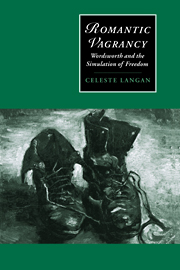Book contents
- Frontmatter
- Contents
- Acknowledgments
- List of abbreviations
- A methodological preamble
- Introduction
- 1 Rousseau plays the beggar: the last words of citizen subject
- 2 Money walks: Wordsworth and the right to wander
- 3 Walking and talking at the same time: the “two histories” of The Prelude
- 4 The walking cure
- Notes
- Works cited
- Index
- CAMBRIDGE STUDIES IN ROMANTICISM
4 - The walking cure
Published online by Cambridge University Press: 19 October 2009
- Frontmatter
- Contents
- Acknowledgments
- List of abbreviations
- A methodological preamble
- Introduction
- 1 Rousseau plays the beggar: the last words of citizen subject
- 2 Money walks: Wordsworth and the right to wander
- 3 Walking and talking at the same time: the “two histories” of The Prelude
- 4 The walking cure
- Notes
- Works cited
- Index
- CAMBRIDGE STUDIES IN ROMANTICISM
Summary
THE THERAPEUTIC SUBJECT
I wish you would write a poem, in blank verse, addressed to those, who, in consequence of the complete failure of the French Revolution, have thrown up all hopes of the amelioration of mankind, and are sinking into an almost epicurean selfishness, disguising the same under the soft titles of domestic attachment and contempt for visionary philosophes. It would do great good, and might do for a part of “The Recluse”, for in my present mood I am wholly against the publication of any small poems.
(S. T. Coleridge to W. Wordsworth, 10 September 1799)Did Mr Wordsworth really imagine, that his favorite doctrines were likely to gain anything in point of effect or authority by being put in the mouth of a person accustomed to higgle about tape, or brass sleeve-buttons?
(Francis Jeffrey, review of The Excursion)Perhaps the image of psychological man presented here is the one most appropriate and safe for use in this age. It is the self-image of a travelling man rather than a missionary. Unfortunately for culture and good taste, the salesman always cruelly parodies the preacher–without being able to help doing so, for his cultural history has dictated to the salesman the rhetorical style of the missionary.
(Rieff, “Introduction” to Freud: Therapy and Technique)When Philip Rieff identifies the subject of Freudian analysis as the “isolated individual and defaulting citizen,” he restores to critical attention the historical relation of the psychoanalytic subject of desire to the political subject of the discourse of rights. By describing the psychoanalytic subject as a “defaulting” citizen, Rieff suggests that the therapeutic subject emerges as a consequence of the hegemony of the private over the public sphere.
- Type
- Chapter
- Information
- Romantic VagrancyWordsworth and the Simulation of Freedom, pp. 225 - 271Publisher: Cambridge University PressPrint publication year: 1995

